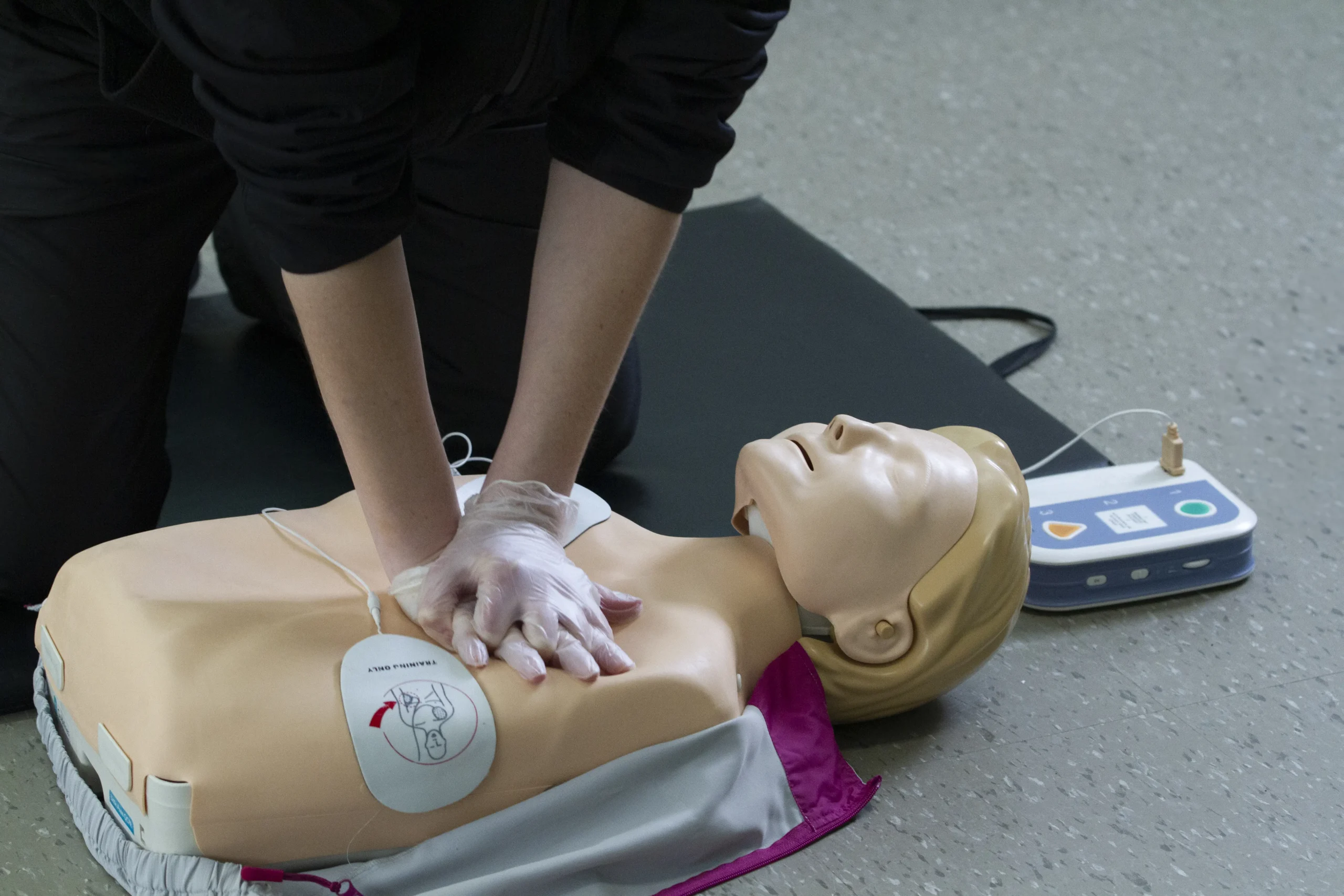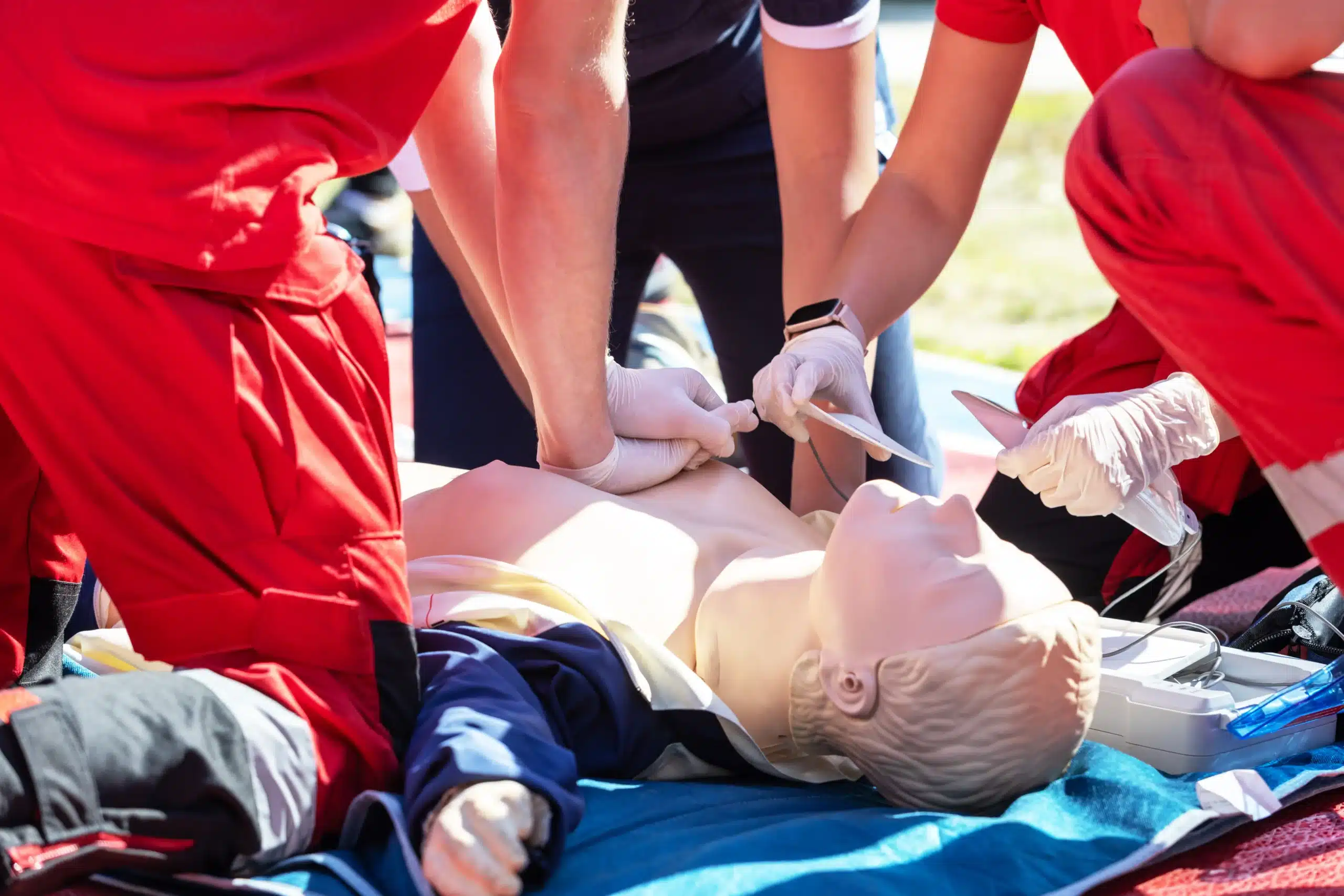Balancing work, family, and continuing education can feel overwhelming, especially in demanding fields like healthcare. RQI PALS understands this struggle and offers a streamlined approach to Pediatric Advanced Life Support training. By combining online learning with shorter, more focused in-person skills sessions, RQI PALS makes it easier to stay current with your certification without sacrificing your valuable time. If your search for “RQI PALS classes near me” has led you here, you’re in the right place. This guide provides a comprehensive overview of RQI PALS, including its benefits, how to find local classes, and what to expect during training.
Key Takeaways
- RQI PALS makes pediatric advanced life support training more manageable: The blended learning format combines online modules with shorter, hands-on skills sessions, offering flexibility for busy professionals.
- RQI PALS certification benefits a wide range of professionals: Whether you’re a doctor, EMT, or childcare provider, this training equips you with essential skills to handle pediatric emergencies.
- Maintaining RQI PALS certification requires ongoing effort: Regular practice and continuing education are crucial for staying current with evolving pediatric emergency care guidelines.
What are RQI PALS Classes?
RQI PALS classes offer a more manageable approach to Pediatric Advanced Life Support training by combining online learning with shorter, more frequent in-person skills sessions. Unlike traditional PALS courses, which often involve lengthy, single-day classes, the RQI approach uses a blended learning format. This allows healthcare providers to learn at their own pace and refresh their skills regularly, making training more accessible and convenient, especially for busy professionals. For a deeper dive into RQI PALS, check out this helpful guide.
Why Pediatric Advanced Life Support Matters
Pediatric Advanced Life Support (PALS) certification equips healthcare providers with the knowledge and skills to respond effectively to pediatric emergencies. It’s a common misconception that PALS certification is the same as basic life support (BLS). While both are crucial, PALS goes much deeper into specialized pediatric care. This specialized training covers various life-threatening situations, from respiratory distress and cardiac arrest to shock and post-resuscitation care. Maintaining current PALS certification can significantly impact a child’s outcome during a medical crisis. To learn more about common misconceptions surrounding PALS, take a look at this informative article. We offer BLS certification as well.
How RQI Improves PALS Training
RQI enhances PALS training by making it more cost-effective and convenient. The flexible, blended learning format often results in lower overall costs compared to traditional PALS courses. Shorter, more frequent sessions help healthcare professionals maintain proficiency and build confidence, unlike traditional, infrequent CPR training. This approach ensures that skills remain sharp and providers are always ready to respond effectively. If you’re interested in finding RQI PALS classes, this guide offers helpful resources. Plus, RQI helps you keep your CPR skills sharp with frequent practice and immediate feedback, as explained in this RQI certification guide. Our Sacramento location offers a low price guarantee.
Find RQI PALS Classes Near You
Locating a convenient and reputable RQI PALS class is easier than you think. Here are a few ways to find training centers near you:
Check Local Healthcare Facilities
Hospitals and clinics often offer RQI PALS training for their staff and sometimes open these courses to the public. Contact nearby hospitals, urgent care centers, and other healthcare facilities to inquire about upcoming RQI PALS classes. Many facilities maintain a calendar of training sessions, making it easy to find a class that fits your schedule.
Explore Online Training Platforms
Online learning platforms offer a convenient way to complete the cognitive portion of RQI PALS training. These platforms provide self-paced modules and interactive exercises, allowing you to learn the material at your own speed. Keep in mind that RQI PALS certification requires both online and in-person skills sessions, so you’ll still need to find a local instructor for the hands-on component.
Consider Safety Training Seminars in Sacramento
If you’re in the Sacramento area, Safety Training Seminars offers RQI courses, including PALS. They provide a supportive learning environment and flexible scheduling options. For those outside of Sacramento, the American Heart Association offers courses nationwide, training hundreds of thousands of medical and healthcare professionals every year. If you’re looking for affordable, high-quality training, check out their website for upcoming class schedules and registration information.
Understand RQI PALS Class Structure and Format
The Blended Learning Approach
RQI PALS classes use a blended learning format, combining online learning with in-person skills practice and testing. This approach offers flexibility and efficiency for busy healthcare professionals. It allows you to learn the core PALS concepts and protocols at your own pace online, then demonstrate your skills in a practical setting. This blended learning style has been shown to improve knowledge retention and practical application compared to traditional classroom-based courses. The online portion allows you to review materials as needed, ensuring a solid foundation before the hands-on session.
Online Components
The online component of RQI PALS typically involves interactive modules, videos, and self-assessments. You’ll work through the curriculum at your own speed, reviewing key concepts like child CPR, airway management, and treatment algorithms for pediatric emergencies. This self-directed learning allows you to focus on areas where you need more practice and reinforces your understanding of essential PALS protocols. Many programs offer online practice exams to help you prepare for the in-person skills check.
Hands-On Skills Sessions
After completing the online modules, you’ll schedule a short, hands-on skills session with a certified RQI instructor. This session focuses on demonstrating your proficiency in essential PALS skills, such as performing CPR on an infant manikin and using a bag-valve mask. The instructor provides personalized feedback and guidance, ensuring you’re confident and competent in your abilities. This practical experience is crucial for translating your online knowledge into real-world application. It’s also an opportunity to ask questions and clarify any remaining uncertainties before receiving your certification. Our Sacramento location offers convenient skills sessions for students in Sacramento, Roseville, and Rocklin, CA. Contact us to schedule your skills session today.
Duration and Prerequisites
The online portion of RQI PALS usually takes between 3.5 and 5 hours to complete, depending on your learning style and pace. The subsequent hands-on skills session typically lasts 30-40 minutes. While there aren’t strict prerequisites for RQI PALS, a basic understanding of medical terminology and procedures is helpful. RQI PALS is designed for healthcare providers who need to maintain their PALS certification, so prior PALS training is assumed. Check with your certifying body or employer for specific requirements. We offer a low price guarantee on all our courses, making it affordable to stay current with your certifications.
Know What to Expect in Your RQI PALS Training
RQI PALS training offers a flexible and effective way to keep your pediatric life support skills sharp. It’s designed to build on your initial PALS training with ongoing practice and skills checks. This approach leads to better outcomes for both healthcare providers and patients. Here’s a closer look at what to expect during your RQI PALS training:
Course Content and Objectives
RQI PALS courses cover essential concepts and skills for managing pediatric emergencies. You’ll review core algorithms, practice effective team dynamics, and learn how to apply critical thinking in high-pressure situations. The curriculum emphasizes early recognition and intervention for respiratory and cardiac arrest in infants and children. The blended learning format makes it easier to refresh your knowledge and maintain your skills.
Assessment Methods
RQI PALS uses a combination of online and in-person assessments. First, you’ll complete the online portion of the course at your own pace, which typically takes a few hours. Afterward, you’ll schedule a short, hands-on skills assessment at a training center. This session usually lasts 30–40 minutes and allows instructors to evaluate your proficiency in essential PALS techniques. Check with your local training center for available times.
Certification Process
Upon successful completion of both the online modules and the hands-on skills assessment, you’ll receive your RQI PALS certification. This certification demonstrates your competency in providing high-quality CPR and validates your participation in the ongoing RQI program. This approach ensures that healthcare providers maintain up-to-date knowledge and skills in pediatric advanced life support.
Evaluate RQI PALS Class Cost and Value
When considering RQI PALS training, it’s helpful to understand the costs involved and the long-term value it offers. This breakdown will help you make an informed decision about pursuing this essential certification.
Price Ranges and Factors Affecting Cost
One of the key advantages of RQI PALS is its cost-effectiveness compared to traditional PALS courses. The flexible, blended learning format, with shorter, more frequent sessions, often translates to lower overall costs. Traditional PALS courses can be more expensive due to longer class times and the need for more resources. RQI PALS classes typically involve a combination of online modules and shorter in-person skills sessions, which contributes to their affordability. Several factors can influence the final price, including the training center’s location, the format (in-person vs. blended learning), and any included materials. For those seeking affordable options in the Sacramento area, Safety Training Seminars offers competitive pricing on RQI courses.
Discounts and Financial Assistance
It’s worth exploring potential discounts or financial assistance programs to make RQI PALS training even more accessible. Some employers offer free or discounted courses for their employees, recognizing the value of certified professionals. Non-profit organizations or local training centers may also have financial assistance programs available. Check with your employer, local healthcare facilities, or training centers like Safety Training Seminars to see what options are available. Remember, investing in your professional development through RQI PALS certification is an investment in your career and the quality of care you provide. Safety Training Seminars offers a low price guarantee for their courses.
Long-Term Benefits for Healthcare Professionals
While cost is a factor, consider the long-term benefits of RQI PALS certification. The RQI program, developed by the American Heart Association, offers a modern and efficient way for medical professionals to maintain their PALS certification. Unlike traditional, infrequent CPR training, RQI keeps your skills sharp with frequent, short practice sessions and immediate feedback. This helps you maintain proficiency and build confidence in your abilities to respond effectively in pediatric emergencies. The RQI approach not only ensures you meet certification requirements but also equips you with the skills and confidence to provide the best possible care. This translates to improved patient outcomes and greater peace of mind in your professional practice. For healthcare providers in Sacramento, Roseville, and Rocklin, Safety Training Seminars offers convenient access to these valuable courses.
Who Should Take RQI PALS Classes?
RQI PALS classes equip healthcare providers with the knowledge and skills to respond effectively to pediatric emergencies. But who exactly benefits from this specialized training? Let’s explore the key groups who should consider RQI PALS certification.
Healthcare Professionals
RQI PALS training offers several advantages for healthcare providers working with infants and children. It’s designed to be more flexible and effective than traditional PALS courses, leading to better outcomes. The program focuses on the specific needs of pediatric patients, equipping providers with the skills to manage emergencies. This makes it ideal for nurses, doctors, respiratory therapists, and other medical professionals who regularly interact with young patients. RQI PALS complements your initial PALS training with ongoing practice. The blended learning format makes it easier to refresh your knowledge and maintain your skills. For those seeking affordable options, consider our low price guarantee on CPR and first-aid certification courses.
Emergency Medical Technicians
For EMTs and paramedics, RQI PALS certification is essential. Working with infants and children in emergency situations requires specialized training, and RQI PALS addresses this need. It provides the tools and confidence to assess and manage pediatric emergencies effectively, potentially saving lives. The flexible, ongoing nature of RQI also helps EMTs stay sharp and ready to respond. If you’re an EMT looking to enhance your pediatric emergency care skills, explore our RQI classes in Sacramento. We serve Sacramento, Roseville, and Rocklin, CA.
Childcare Providers and Educators
While not always required, RQI PALS training is highly recommended for childcare providers, educators, and camp counselors. Knowing how to respond to a medical emergency involving a child can make all the difference. RQI PALS empowers these professionals with life-saving skills, creating a safer environment for the children in their care. Even basic knowledge of pediatric first aid and CPR can be invaluable in these settings. Consider adding EMSA Child Care Health & Safety training to further enhance your skills. We offer a variety of certification courses, including BLS and ACLS, to meet your specific needs.
Prepare for Your RQI PALS Class
So, you’re signed up for an RQI PALS class—great! Taking a proactive approach to your training will make the process smoother and help you get the most out of it. Here’s how to prepare:
Gather Required Materials and Pre-Course Study Tips
RQI PALS uses a blended learning approach, combining online modules with hands-on skills sessions. Before your class, you’ll complete online coursework through the RQI platform. This often involves interactive lessons, case studies, and quizzes to assess your understanding of the material. Ensure you have access to a reliable computer and internet connection. If your employer requires BLS certification, you’ll also need to complete the RQI BLS course, which includes online modules and skills assessments at designated RQI Skill Stations. You can find more information about this requirement in the RQI FAQs. Even a quick review of core PALS concepts can make a big difference in your preparedness.
What to Bring on Training Day
When you head to your in-person skills session, bring your AHA BLS Provider eCard (if applicable), a notebook, and a pen for taking notes. Comfortable clothing is also a good idea, as you’ll be practicing skills like CPR and using a mannequin. While many training centers, like our Sacramento location, provide all the necessary equipment, it’s always a good idea to double-check what’s required. Having your materials organized will help you focus on the training. RQI PALS courses often have daily classes, so find a schedule that works best for you.
Overcome Common RQI PALS Training Challenges
RQI PALS training is designed to be flexible and convenient, but challenges can still arise. Here’s how to overcome a few common hurdles:
Manage Your Time Effectively
Juggling work, family, and other commitments can make finding time for training tough. Thankfully, RQI PALS offers flexible learning options to fit your busy schedule. Shorter, more frequent sessions and self-paced online modules allow you to learn and practice when it’s most convenient. Consider breaking down your study time into smaller chunks throughout the week, rather than cramming everything in at once. Even short bursts of focused study can be surprisingly effective.
Address Technical Issues
Technical glitches can be frustrating, especially when you’re on a tight schedule. The American Heart Association’s RQI courses train hundreds of thousands of healthcare professionals every year, so technical issues can sometimes occur. If you experience problems with the online platform, contact your training center’s support team right away. They can troubleshoot issues and get you back on track quickly.
Fill Knowledge Gaps
It’s normal to feel a little rusty if it’s been a while since your last PALS training. The RQI ALS and PALS programs use a diagnostic entry point to evaluate your current knowledge and create a personalized learning experience. Take advantage of any pre-course materials or refresher resources offered by your training center. If you’re struggling with specific concepts, ask your instructor for clarification. They can provide additional support and resources to help you master the material.
Maintain Your RQI PALS Certification
PALS certification isn’t a one-time thing—it’s an ongoing commitment to learning and improving your skills. One common misconception is that once you’re certified, you’re good to go for life. The truth is, PALS certification needs to be renewed regularly to make sure your knowledge and skills are current. This isn’t just about checking a box; it’s about ensuring you’re prepared to provide the best possible care for pediatric patients in emergencies.
Renewal Process and Continuing Education
RQI PALS training offers a more flexible and effective way to maintain your skills than traditional PALS courses. This approach leads to better outcomes for both healthcare providers and, most importantly, their patients. The RQI program, developed by the American Heart Association, provides quarterly training to help you stay sharp and master high-quality CPR skills. It complements your initial PALS training with ongoing practice, using a blended learning format that combines online modules and hands-on skill sessions. This makes it much easier to refresh your knowledge and maintain those crucial skills.
Stay Current in Pediatric Emergency Care
The medical field is constantly evolving, and pediatric emergency care is no exception. New research, guidelines, and best practices emerge regularly. Staying up-to-date is crucial for providing effective care, and RQI PALS helps you do just that. It ensures you have the latest knowledge and techniques at your fingertips. By committing to ongoing PALS training, you demonstrate your dedication to providing the highest standard of care for young patients. This commitment not only benefits your patients but also enhances your professional credibility and keeps you at the forefront of pediatric advanced life support.
RQI PALS Providers and Training Centers
Finding the right provider for your RQI PALS training is essential for a smooth and valuable learning experience. Several reputable organizations offer high-quality RQI PALS courses, and understanding their strengths can help you make an informed decision.
American Heart Association
The American Heart Association developed the RQI program to improve CPR skills and knowledge. They set the standards for resuscitation training, so choosing an AHA-affiliated training center ensures you’re receiving instruction based on the latest scientific guidelines. Their program emphasizes frequent practice and assessment to help healthcare providers maintain proficiency in high-quality CPR. For example, Safety Training Seminars is a woman-owned AHA Training Center offering RQI and PALS certification in Sacramento. Check with your local training centers for RQI options.
Laerdal Medical
Laerdal Medical plays a key role in RQI PALS training by providing innovative technology and resources. Their training solutions often incorporate simulation and real-time feedback, creating an engaging and effective learning environment. This technology helps students refine their skills and gain confidence in their ability to respond to pediatric emergencies. Laerdal’s focus on technology enhances the learning experience and makes skill mastery more attainable.
HealthStream
HealthStream offers a comprehensive platform for healthcare training, including RQI PALS courses. They focus on providing flexible and convenient learning options, allowing healthcare professionals to fit training into their busy schedules. HealthStream’s approach to RQI emphasizes short, frequent practice sessions with immediate feedback, which helps providers maintain their skills and build confidence over time. This method contrasts with traditional, less frequent CPR training, making it a more effective way to stay current in a fast-paced healthcare setting. They also offer a variety of other healthcare training and continuing education courses.
Wolters Kluwer
Wolters Kluwer also provides RQI training materials and resources for healthcare professionals. They offer a range of learning solutions designed to support ongoing competency and improve patient care. Wolters Kluwer’s resources can be a valuable supplement to formal RQI training programs, helping providers stay up-to-date with the latest guidelines and best practices. They are a trusted source of information for healthcare professionals seeking to enhance their skills and knowledge.
Related Articles
- RQI Classes in Sacramento, CA – Sacramento CPR Classes
- PALS Classes in Sacramento, CA – Sacramento CPR Classes
- HeartCode PALS: Your Guide to Online Certification – Sacramento CPR Classes
- Online PALS Classes in Sacramento: Your Guide – Sacramento CPR Classes
- Pediatric Advanced Life Support (PALS) in Sacramento – Sacramento CPR Classes
Frequently Asked Questions
What is the difference between RQI PALS and traditional PALS certification?
RQI PALS uses a blended learning format with online modules and shorter, more frequent in-person skills sessions, while traditional PALS typically involves a longer, single-day class. This makes RQI more flexible and convenient for busy professionals.
Why is PALS certification important for healthcare providers?
PALS certification equips healthcare providers with specialized knowledge and skills to effectively manage pediatric emergencies, going beyond basic life support (BLS) training. It covers a wide range of critical situations, from respiratory distress to cardiac arrest, ultimately improving outcomes for young patients.
How can I find RQI PALS classes near me?
You can check with local hospitals and clinics, explore online training platforms, or contact Safety Training Seminars in Sacramento for information on available courses. Many healthcare facilities offer RQI PALS training, and online platforms can help you find local instructors for the required in-person skills sessions.
What should I expect during an RQI PALS skills session?
Expect to demonstrate your proficiency in essential PALS skills, such as infant and child CPR, using a bag-valve mask, and applying learned protocols. The instructor will provide feedback and guidance to ensure you are confident and competent.
How much does RQI PALS training cost, and what is its value?
RQI PALS is often more cost-effective than traditional PALS due to its blended learning format. The price can vary based on location and training center, but it’s a valuable investment in your career, enhancing your skills and improving patient care. Check with specific providers for pricing details and any available discounts.







